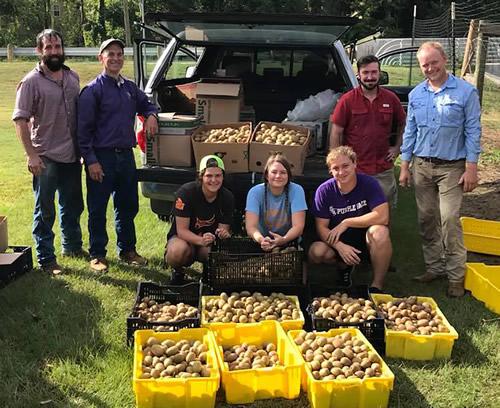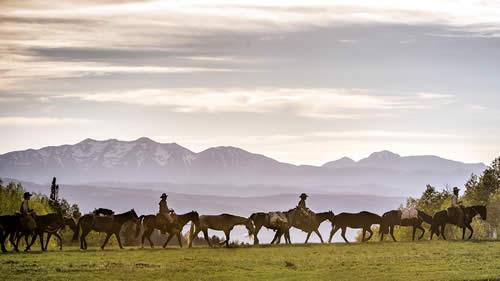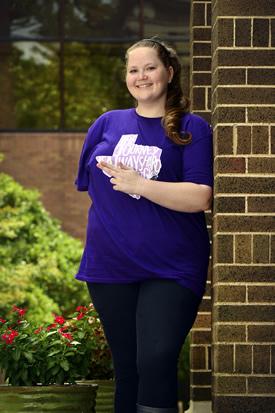SFA University

Since SFA Gardens’ initial kiwifruit harvest in 2014, the expanding plot of golden kiwifruit, located on the Stephen F. Austin State University campus, has produced more than 1,500 pounds of the small, tender-fleshed fruit. The plots, which produced Texas’ first successful kiwifruit harvest, are part of ongoing research led by Dr. David Creech, SFA professor emeritus of agriculture and director of SFA Gardens, to determine this fruit’s potential as a commercial crop in Texas. Pictured from left to right with this year’s kiwifruit harvest are Duke Pittman and Malcolm Turner, SFA Gardens technicians; Elzanne Naude, Samantha Holding, Christopher Vondergroeben and John Dilday, SFA Gardens student workers; and Tim Hartmann, program specialist in horticulture.
September 5, 2018 Nacogdoches — Researchers at SFA Gardens are reaping the sweet rewards of their ongoing investigation into the feasibility of adding kiwifruit to the state’s long list of agricultural commodities.
Since the initial crop produced in 2014 – the state’s first-ever successful kiwifruit harvest – the expanding plot of golden kiwifruit, located on the Stephen F. Austin State University campus, has produced more than 1,500 pounds of the small, tender-fleshed fruit.
“We collected 750 pounds this year,” said Dr. David Creech, SFA professor emeritus of agriculture and director of SFA Gardens. “The harvest came a little early this year, likely due to the intense heat we’ve had.”
While kiwifruit is eaten when tender, Creech explained they are harvested while still firm. To know when the crop is ready for harvest, the sugar content of the fruit is regularly monitored.
“We check the sugar content with a refractometer, which is a hand-held tool,” Creech said. “You cut the fruit in half and place some juice on the tool, and when the sugars hit a brix measurement of 10 to 12 you’re ready to harvest.”
In 2011, Dr. Jay Spiers, associate professor of horticulture at Auburn University and a longtime friend of Creech, provided SFA with the initial 30 vines comprised of three female and three male varieties.
These fruits do not share the appearance of the typical fuzzy-skinned, green-fleshed kiwifruits commonly found at supermarkets. These varieties, known as golden kiwis, have a smooth, edible skin and golden-colored flesh.
According to researchers at Auburn University, the varieties trialed at SFA, including the AU Golden Dragon and AU Golden Sunshine, contain antioxidants that provide higher levels of cellular protection than those found in green-fleshed varieties.
“When we first grew kiwis in 2011, we really didn’t know a thing about them because no one had ever fruited them in Texas,” Creech said. “When we fruited them in 2014 on young vines, some of my agriculture buddies thought it was a fluke, but then we had a big crop in 2015, which opened some eyes.”
Since that initial harvest, Creech’s knowledge of the kiwifruit industry has continued to expand.
This spring, Creech spent two weeks in New Zealand, one of the world’s leading producers of kiwifruit, visiting orchards with a group of interested Texas investors. In 2017, he traveled to Changsha, China, to study the work of Yanoon BioTech Company’s kiwifruit breeding program. Creech also spent a week in California’s kiwifruit growing regions, where the ubiquitous green kiwifruit varieties thrive.
“The golden kiwifruits are grown in California, but success has proven to be difficult due to the low humidity and high sunlight pressures placed upon this thin-skinned fruit,” Creech said. “The higher humidity of the Gulf Coast South, less intense sunlight and wind pressures are favorable to golden kiwifruit culture.”
Creech said that commercial fields can produce up to 50,000 pounds of kiwifruit per acre, which requires substantial infrastructure investment in the form of support systems and trellises for the vines.
“It’s a real high-technology crop,” Creech said. “You have a male and female plant, and it has to be the right male in terms of the time of pollen shed and stigma receptivity.”
Creech said that many farmers in New Zealand are transitioning to all female kiwifruit orchards and implementing artificial pollination using pollen collected from all-male kiwifruit orchards. These cautionary steps are taken because even if the female plants are fertilized, the success and size of the fruit relies on the amount of pollen transferred, and natural pollinators are not always reliable if weather is inclement during the blooming period.
“When you have that kind of investment, you need to ensure good pollination,” Creech said.
In addition to the trial plots at SFA, new plots are being installed in northeast Texas and on the northwest side of Houston to determine if certain areas of the state are more conducive to plant growth.
“It’s a long-term project, like so many new crops,” Creech said. “So far, we’re encouraged, and we do think there is some opportunity. We have a long way to go to fully understand the technology needed to produce the kind of yields and production they get in New Zealand and California.”
For more information regarding this research, contact Creech at (936) 468-4343 or dcreech@sfasu.edu.
September 4, 2018 Nacogdoches — Military veterans, ROTC members and their guests are invited to attend a social for community veterans, sponsored by Stephen F. Austin State University’s Veterans Resource Center, from 5 to 8 p.m. Wednesday, September 12, at Maklemore’s Ale House and Bistro, located at 2304 North St.
Joe Cuellar, a veteran of the U.S. Army and singer/songwriter from Lufkin, will perform a medley of songs, some his original music, from genres ranging from folk to country. There is no cover charge, and free appetizers (until they are gone) will be provided.
“SFA has a large population of students who also are veterans,” John Fontenot, VRC coordinator, said. “Our community’s military men and women have a strong bond — they are like a family. Through this event, we hope to help connect those who have served our country and provide them with an opportunity to network, relax and have fun.”
For more information about the social, contact Fontenot at (936) 468-6494.
September 3, 2018 Nacogdoches — Stephen F. Austin State University has launched a degree program catered toward students passionate about nutrition.
The new bachelor’s degree in food and nutrition serves as a specialized plan for students pursuing a career in nutrition-related fields.
Unlike the dietetics and nutritional sciences degree offered at SFA, this new degree focuses less on clinical nutrition and more on community nutrition.
“Our focus has always been for students to succeed,” said Sarah Drake, clinical instructor in SFA’s School of Human Sciences. “We work with all students to ensure they are in the right program and make them all aware of the options available to them. We believe this new degree will be a great fit for many of our program’s students.”
In addition to core curriculum, the food and nutrition degree includes opportunities for internships and a minor, such as child and family development, communications, or culinary. Courses will be taught online and face-to-face on the SFA campus.
“A trend we have seen in our field is a growing interest in nutrition degrees that are not geared toward becoming registered dietitians; therefore, creating a separate degree better meets these students’ interests,” Drake said.
Through this program, students will learn about food service management theories, nutrition counseling and nutritional education. Career opportunities for students with a nutrition degree include food service management facilities, food banks, pharmaceutical sales, experimental food labs and employment with school districts.
For more information, visit sfasu.edu/hms/101.asp.
August 30, 2018 Nacogdoches — Seventy members of the newly re-established Lumberjack Band Alumni Association, including generations of Lumberjack Marching Band musicians and twirlers, are scheduled to perform during halftime of the SFA versus Tarleton State University football game, and with registration still open, more are expected to join in the festivities.
After initially forming in the 1970s before disbanding about a decade ago, this new group organized last year.
“The first Lumberjack alumni band was created by Jim Hagood in the 1970s,” said Paige Pattillo-Brown, LBAA organizer and former SFA feature twirler. “Unfortunately, that organization ceased to exist more than a decade ago. I drafted the bylaws and created the new Lumberjack Band Alumni Association last year. In 2017, we had 71 members and, this year, 37 more members have joined.”
In 2016, a reunion was held to celebrate the band's 90th anniversary and the Twirl-O-Jacks' 60th anniversary, but an official alumni organization did not exist at that time. Brown, along with Kristen Badders Conklin, assist each year in judging SFA twirling tryouts, and following the 2016 tryouts, the two volunteered to help plan another reunion for 2017. They soon found themselves creating a new organization.
The purpose of the LBAA is centered on financial and other support of current Lumberjack Marching Band members.
“Former band members have always expressed what a wonderful time they had in the band, and we want current students to have an exceptional experience, as well,” Brown said. “We raised more than $2,000 our first year. With that money, we were able to provide small scholarships for the section leaders, give commemorative SFA band blankets to the graduating seniors and feed the entire band pizza during a summer band practice. Our goals are still the same; we just want to give more money each year to assist the current band.”
Former SFA twirler Mary Jo Morris of New Braunfuls also will return for a second year to perform during halftime. The 88-year-old alumna twirled for SFA 70 years ago in 1948 and 1949.
The SFA football game against Tarleton State University will begin at 6 p.m. September 8, at Homer Bryce Stadium.
The second annual LBAA halftime performance will take place as part of the 2018 Lumberjack Marching Band and Twirl-O-Jacks Reunion, which is slated for the same day. Registration and a tentative schedule of events can be found online at sfaalumni.com/event/LMBTOJ18, or call the SFA Alumni Association at (936) 468-3407 for additional information. LBAA annual membership is $45; lifetime membership is $250.

August 28, 2018 - The Stephen F. Austin State University School of Art and the Friends of the Visual Arts will present a free, one-night screening of the documentary “Unbranded” at 7pm Friday, Sept. 7, in The Cole Art Center at The Old Opera House in downtown Nacogdoches.
In this film directed by Phill Baribeau, four young cowboys hatch an outrageous plot to adopt, train and ride a string of wild mustangs 3,000 miles from Mexico to Canada through the wildest terrain of the American West. The trip became an epic journey of self-discovery, tested friendships and iconic landscapes that included runaway horses, a sassy donkey, perilous mountain passes, rodeos, sickness, injury and death, according to the description at http://watch.unbrandedthefilm.com
The Audience Award winner at Telluride Mountainfilm and Hot Docs Film Festival, “Unbranded” is a “soaring tale of danger and resilience” and “an emotionally charged odyssey that shines a bright light on the complex plight of our country's wild horses,” according to the website.
This screening is part of the School of Art’s monthly Friday Film Series and is sponsored in part by William Arscott, Nacogdoches Film Festival, Karon Gillespie, Mike Mollot, David Kulhavy, John and Kristen Heath, Galleria Z, Jill Carrington, Jean Stephens, Jim and Mary Neal, Richard Orton, Nacogdoches Junior Forum and Main Street Nacogdoches.
The Cole Art Center is located at 329 E. Main St. For more information, call (936) 468-1131.
August 28, 2018 Nacogdoches — Stephen F. Austin State University’s mathematics education program has been ranked among the best in the nation in multiple categories, according to College Choice.
A website that rates accredited public and private institutions based on institutional reputation, graduation rates, selectivity and faculty resources, College Choice ranked the program fourth in most affordable and 12th in best online.
“The Department of Mathematics and Statistics is honored by this recognition,” said Dr. Lesa Beverly, professor and chair of the department. “We have always been dedicated to preparing strong mathematics educators. The online program is our latest venture in this direction, designed specifically to accommodate the schedule of working students who have the goal of becoming highly qualified mathematics teachers.”
The department offers both a bachelor’s in mathematics with a secondary education minor and an online master’s in school mathematics teaching.
“Because the capacity of mathematics teachers is well below the level of need, we must find innovative ways to provide opportunities for interested students,” Beverly said. “The fact that our online mathematics program is a national exemplar is extremely exciting.”
To learn more about the program, visit sfasu.edu/academics/colleges/sciences-math/math-stats/academics/math-education.
By Joanna Armstrong, senior marketing communications specialist at Stephen F. Austin State University.
August 23, 2018 Nacogdoches — The Stanley Center for Speech and Language Disorders at Stephen F. Austin State University will begin offering free speech therapy to people with Parkinson’s disease Sept. 4 through a two-part grant-funded program with the Parkinson Voice Project: Speak out! and Loud Crowd.
The Parkinson Voice Project is a nonprofit organization dedicated to addressing speech disorders that people with Parkinson’s disease develop. Through the grant, five faculty members in SFA’s Department of Human Services and all graduate students studying speech-language pathology have been trained to conduct the program.
Speak out! is a four-week intensive individual therapy program designed to address the motor speech deficits associated with Parkinson’s disease, such as softer speech, a hoarse or scratchy voice and inconsistent speech volumes.
“People with Parkinson’s disease lose dopamine, a chemical released by neurons to send signals to other nerve cells, which helps them communicate with all parts of the body,” said Deena Petersen, director for the Stanley Center for Speech and Language Disorders at SFA. “Through this program, we teach people how to be intentional in their speech. This helps bypass the part of the brain that requires dopamine.”
After completing the Speak out! phase, participants will progress to the Loud Crowd portion, where they will engage in a group therapy setting once a week for maintenance.
The Stanley Center for Speech and Language Disorders doubles as a community clinic and learning facility for SFA students to hone their skills in a supervised setting. Graduate students will be conducting the therapy supervised by licensed speech-language pathologists for both parts of the program.
“There are limited services in the area for those with Parkinson’s disease, and we feel offering these two programs will provide an opportunity to enhance the communication skills of this population and bring more adults into the clinic,” Petersen said.
For more information, contact the center at (936) 468-7109.
August 20, 2018 Nacogdoches — Just one year and a day after the traumatic car accident that resulted in the amputation of Marissa Rotenberry’s right arm, she recently walked the stage at Johnson Coliseum and received her diploma for a master’s in statistics.
 During her extended hospitalization following the accident, she had a singular focus pushing her through recovery – finishing her degree.
During her extended hospitalization following the accident, she had a singular focus pushing her through recovery – finishing her degree.
“It was very traumatic, but it didn’t change me,” Rotenberry said, “and it didn’t have to change my goals.”
Set to start her final semester of graduate school, her plans came to a temporary standstill on Aug. 10, 2017, when she was involved in the accident.
Sitting in the backseat with her arm near the window, Rotenberry took the brunt of the impact when the car crashed. Her arm was mangled by glass, and she sustained other severe injuries, including a lacerated liver, fractured discs and an internal chest degloving (an injury occurring when the skin separates from the muscle).
“I remember being in and out of consciousness,” she said. “I was never confused about what was going on, and I was very aware I had been in a bad car accident.”
Paramedics rushed Rotenberry to Nacogdoches Memorial Hospital and then transported her to Ben Taub Hospital in Houston, where doctors decided to amputate her arm. She remained there for 34 days.
With her extensive injuries, she took recovery one day at a time and celebrated every small victory.
“I remember the second day I was there, they had me sit up in a chair, and I got applauded,” she said.
Rotenberry went through occupational therapy and had three surgeries each week to tend to her wounds.
“It wasn’t until day 33 I knew I was leaving,” she said.
Less than three months after the accident, Rotenberry returned to school.
“I was only one semester away from graduation, so there was no doubt in my mind I wanted to finish it,” she said. “Grad school is hard work. It would essentially be throwing away the time I already put in, and that just seemed crazy.”
Because she started back in the middle of the semester, her professors customized the remaining part of her degree plan to give her time to study while focusing on healing. Working with Rotenberry was the department’s way of repaying her faith in the university, said Dr. Greg Miller, professor of statistics.
“She has entrusted all of her higher education to us, so we said, ‘What are we going to do about it? What’s the best way to chart a course for her?’” Miller said. “It was not an obligation but a real desire to do right by somebody.”
With the faculty’s help, Rotenberry planned on graduating in May until an infection required additional surgeries and pushed it back to August. Even after the set-back, she continued working toward graduation.
“After you teach for a while, you get good at recognizing talent, but the things you really can’t coach up in people are intangibles,” Miller said. “It’s the resilience. It’s the perseverance. It’s the stick-to-it, dedicated type of attitude that describes Marissa.”
While there have been many challenges on the road to recovery, the biggest change has mostly been mental, Rotenberry said.
“Sometimes it’s easy to forget because I still feel my hand,” she said. “Sometimes I feel like I want to grab things or use it. It’s just that adjustment, always.”
Whatever comes next, Rotenberry remains positive she can overcome any obstacles thrown her way.
“The bigger challenge would have been if I didn’t have any arms,” she said. “You can persevere, and you can keep going. It didn’t have to stop me.”
August 10, 2018 Nacogdoches — Join Stephen F. Austin State University’s SFA Gardens to experience elevated garden design during a Saturday Seminar from 9 a.m. to noon August 18.
Emily Cauble, a 2003 SFA alumna and landscape designer and creative director for Clint Horticulture, will explore the key components to a successfully and beautifully designed garden. Seminar participants will create a base plan to practice the design principles Cauble introduces throughout the seminar.
With 14 years’ experience in the industry, Cauble is passionate about design. Before joining Clint Horticulture, she worked in retail nursery sales and wholesale growing, specifically bedding plants.
“Design seminars at SFA Gardens have been incredibly popular, and Cauble’s experience in the industry will lend to an exciting and informative session,” said Dawn Stover, SFA Gardens research associate.
The seminar will be held at the Brundrett Conservation Education Building located at the Pineywoods Native Plant Center, 2900 Raguet St.
Participation for the garden design seminar is limited, and advanced registration is required. The cost is $25 for SFA Gardens members and $30 for nonmembers. Call (936) 468-4129, or email sfagardens@sfasu.edu to reserve a seat.
August 10, 2018 Nacogdoches – The Music Preparatory Division of the Stephen F. Austin State University School of Music will host an open house from 10 a.m. to 2 p.m. Saturday, August 18, at the Music Prep House, 3028 Raguet St.
Students interested in participating in fall classes or private lessons offered through Music Prep may register during the open house. Auditions for the Piney Woods Youth Orchestra will be held the same day beginning at 10 a.m.
The music program features the study of a variety of musical instruments and choral techniques. Upper-level musicians as well as SFA faculty and students teach private lessons and classes. Music Prep offers private music lessons in piano, harp, violin, viola, Suzuki violin, flute, cello, trumpet, trombone, voice, percussion and more.
Private lessons begin the week of Aug. 20 for 16-week, upper-level faculty instruction and the week of Sept. 10 for 12-week SFA music major instruction.
Information about the various programs offered and lesson application forms are available on the Music Prep website at music.sfasu.edu/prep.
Mail forms to SFA Music Prep, P.O. Box 13043, SFA Station, Nacogdoches, Texas 75962. Call the Music Prep office with credit/debit card information at (936) 468-1291. The Prep office is open from 1 to 5 p.m. Monday through Friday. Forms may also be dropped off at the office.
For additional information, contact program director Pat Barnett at (936) 468-1291 or musicprep@sfasu.edu, or visit the Facebook page SFA Music Prep.









